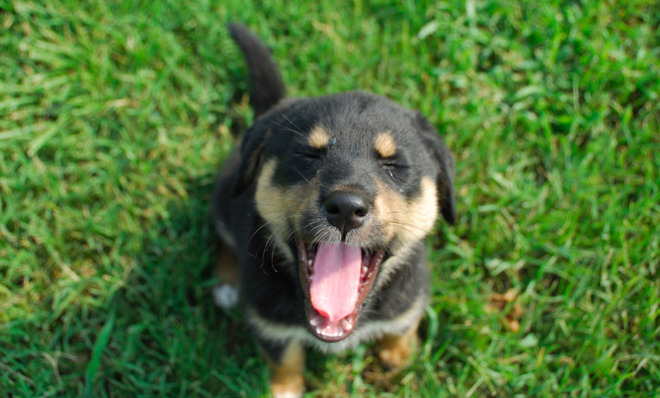15 words etymologically inspired by animals
Animals have always been important to the lives and livelihoods of humans, so it's no wonder they've left a mark on language


A free daily email with the biggest news stories of the day – and the best features from TheWeek.com
You are now subscribed
Your newsletter sign-up was successful
1. BAWL
Comes from the sound that a dog makes. In Latin, the dog says bau bau, and bawl originated in the verb baulare, to bark like a dog. Bawl was first used in English for the cries of dogs, and was later applied to human sobbing and yelling (as in "bawl out").
2. CYNIC
The Week
Escape your echo chamber. Get the facts behind the news, plus analysis from multiple perspectives.

Sign up for The Week's Free Newsletters
From our morning news briefing to a weekly Good News Newsletter, get the best of The Week delivered directly to your inbox.
From our morning news briefing to a weekly Good News Newsletter, get the best of The Week delivered directly to your inbox.
From the Greek cynikos for dog-like, churlish. Though the name might have first been applied to the ancient members of the Cynical philosophical sect because of the school where its founder taught, Cynosarges (place of the white dog), the Cynics were widely thought of as dog-like and churlish by their contemporaries for living on the street and ignoring the rules of decorum.
3. HARPOON
Harpoon also goes back to dogs. It comes from the French harpon, a cramp iron for holding stones together, which came from harpe, the word for a dog's claw.
4. TYKE
A free daily email with the biggest news stories of the day – and the best features from TheWeek.com
Dogs also figure in the history of tyke. It comes from Old Norse tík, a word for female dog. It came to be used as an insult in English, and then as a teasing, reproachful way to refer to children. These days, it's lost the sense of reproach and is just another cute word for the wee ones.
5. PEDIGREE
From the Anglo-Norman pé de grue, for "foot of the crane." It refers to the lines on genealogical charts, which have the look of crane footprints.
6. CAVALIER
Comes from the Old Spanish cavallero for horse-rider, from cavallo, horse. Those horse-riding cavaliers, or knights, could get pretty haughty and disdainful sometimes, giving rise to the adjective we use today. But they could also be gallant and brave, which is why we also have the related word, chivalrous.
7. HOBBY
Hobby was an old nickname, related to Robin, that people in England used to give cart-horses. It became a general word for a nice little pony and then for a toy horse. It later came to mean a pursuit taken more seriously than it should be, like riding a toy horse.
8. HACKNEYED
Horses have been very important to the lives of humans; no wonder we have so many words from them. We got hackney from Old French haquenée, a gentle sort of horse considered especially suitable for ladies to ride. It came to be used as a general term for horses that were hired out and then, by metaphorical extension, for anyone having to do drudge work. If something was all worn out from years of drudgery, then it was hackneyed. Like a stale cliché.
9. BUTCHER
Goes back through Anglo-Norman bocher to Old French bochier, which was formed off the word boc, meaning goat. So a butcher was originally a "dealer in goat's flesh."
10. CAPRICIOUS
Goes back to the Italian capro or goat, an animal known for its herky-jerky, whimsical skipping about.
11. BURRITO
From the Spanish for "little burro" or donkey. These days, burritos can be nearly the same size as their namesakes.
12. EASEL
Another donkey word, from the Dutch for donkey, ezel. An easel is similar to a saw-horse, another four-legged structure you can use to support your work.
13. VACCINE
Formed from vacca, the Latin for cow. The first vaccines were made from cowpox lesions, known as variola vaccinae, which were found to produce immunity from smallpox.
14. AVIATION
Aviation comes from the Latin avis for bird. It was coined in the 19th century, while we were in the middle of trying to figure out how to do that thing that birds do so well.
15. VIXEN
Vixen is the feminine form of fox. Members of the Vulpes vulpes family have given English a host of metaphorical expressions to work with. This is why we can make sense of the phrase "the vixen outfoxed the foxy, sly fox."
Arika Okrent is editor-at-large at TheWeek.com and a frequent contributor to Mental Floss. She is the author of In the Land of Invented Languages, a history of the attempt to build a better language. She holds a doctorate in linguistics and a first-level certification in Klingon. Follow her on Twitter.
-
 How the FCC’s ‘equal time’ rule works
How the FCC’s ‘equal time’ rule worksIn the Spotlight The law is at the heart of the Colbert-CBS conflict
-
 What is the endgame in the DHS shutdown?
What is the endgame in the DHS shutdown?Today’s Big Question Democrats want to rein in ICE’s immigration crackdown
-
 ‘Poor time management isn’t just an inconvenience’
‘Poor time management isn’t just an inconvenience’Instant Opinion Opinion, comment and editorials of the day
